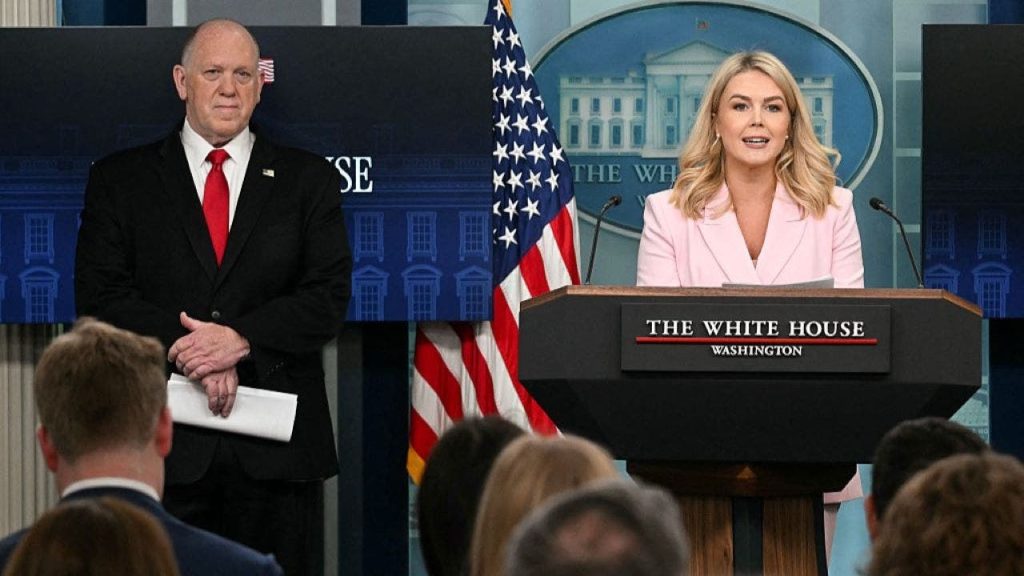The White House commenced its commemoration of President Trump’s first 100 days in office by focusing on its efforts to tackle illegal immigration. During a press briefing, Immigration and Customs Enforcement (ICE) chief Tom Homan joined Press Secretary Karoline Leavitt to report significant declines in border crossings and to discuss new executive orders aimed at deportations and enhanced border security. They emphasized the administration’s initiative, dubbed Operation Tidal Wave, as a historic deportation campaign meant to address pressing concerns regarding illegal immigration.
| Article Subheadings |
|---|
| 1) Overview of the Press Briefing |
| 2) Key Statements from Officials |
| 3) Operation Tidal Wave and Its Implications |
| 4) Recent High-Profile Deportations |
| 5) Community Reactions and Future Plans |
Overview of the Press Briefing
On Monday morning, the White House conducted a press briefing to shed light on the administration’s actions against illegal immigration as part of marking President Trump’s initial 100 days in office. Press Secretary Karoline Leavitt and ICE chief Tom Homan outlined the government’s commitment to maintaining strict immigration controls. Leavitt stated that efforts have resulted in a marked decrease in border crossings, signifying the success of their policies. The briefing was organized to communicate not just the statistics, but the administration’s broader agenda regarding immigration reform and security enforcement.
Key Statements from Officials
The officials at the briefing were adamant about showcasing their achievements during the current administration.
“We are in the process of carrying out the largest deportation campaign in American history,”
asserted Karoline Leavitt. This assertion highlights the administration’s focus on upholding immigration laws and rectifying what they term past laxity under the previous government. Additionally, Tom Homan accused the Biden administration of intentionally compromising border security, claiming they have reversed the gains achieved previously. He emphasized the severe impacts of illegal immigration, especially concerning violence and human trafficking.
Operation Tidal Wave and Its Implications
The briefing detailed Operation Tidal Wave, the administration’s cornerstone initiative for combatting illegal immigration. According to the officials, this effort marks a significant shift in U.S. deportation policy, with the operation characterized as the largest of its kind in the nation’s history. The scope of the operation aims not only to address immediate immigration concerns but also to mean long-term changes in policies regarding the deportation of undocumented migrants. The success of this operation is projected as a precursor for further initiatives in the future, reflecting the administration’s commitment to stricter immigration control.
Recent High-Profile Deportations
Recent actions taken by the administration have involved high-profile deportations, including the deportation of members of Venezuelan gangs. This was enacted under the Alien Enemies Act, an immigration law from 1798. Officials detailed how these deportations are part of broader efforts to secure public safety. The Trump administration, aiming to set a firm tone, has faced some legal setbacks following these actions; however, the intent remains to enforce immigration laws vigorously. These steps are indicative of a strategy aimed at addressing both illegal immigration and the associated violence that it brings.
Community Reactions and Future Plans
The community’s response to these sweeping immigration policies is mixed, with some individuals expressing support for the stricter measures, while others have voiced concern over the humanitarian aspects of deportation. Critics argue that these policies can lead to family separations and undermine the welfare of immigrant communities. The administration, however, remains steadfast in its pursuit, emphasizing the need for robust immigration laws. Future briefings scheduled for the week will further elaborate on these topics, showcasing Treasury Secretary Scott Bessent next in line to address related economic implications.
| No. | Key Points |
|---|---|
| 1 | The White House aims to highlight its immigration policies to mark President Trump’s first 100 days. |
| 2 | ICE Chief Tom Homan emphasizes the need for stringent border control measures. |
| 3 | The administration claims to conduct the most extensive deportation initiative in U.S. history. |
| 4 | Operation Tidal Wave is aimed at reshaping immigration enforcement strategies. |
| 5 | Community responses vary, reflecting support as well as concerns for humanitarian consequences. |
Summary
In conclusion, the Trump administration’s first 100 days have been marked by aggressive initiatives to address illegal immigration through significant policy measures, including Operation Tidal Wave. The focus remains on strict enforcement and rapid deportations, reflecting a commitment to reshaping national immigration policy. As the administration navigates its trajectory, community reactions underscore the complexities of such an approach, suggesting ongoing debates about the balance between security and humanitarian considerations.
Frequently Asked Questions
Question: What is Operation Tidal Wave?
Operation Tidal Wave is a U.S. government initiative aimed at executing the largest deportation campaign in American history, focusing on reducing illegal immigration.
Question: Who is Tom Homan?
Tom Homan is the chief of Immigration and Customs Enforcement (ICE), responsible for implementing immigration laws and managing the deportation processes.
Question: What are the concerns surrounding the current immigration policies?
Concerns include the potential for family separations, humanitarian impacts on immigrant communities, and the legal implications of aggressive deportation tactics.
